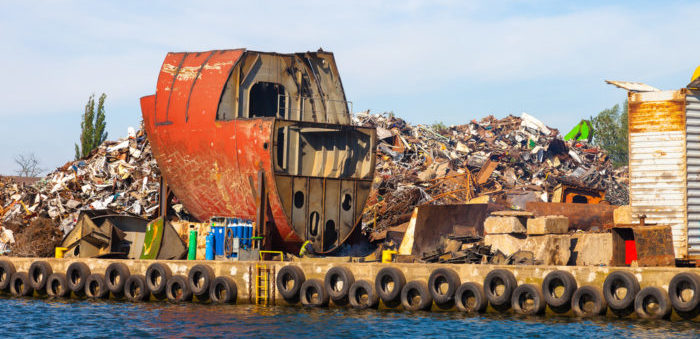While the Hong Kong Convention has been a big step towards sustainable ship recycling, the EU regulation has slowed its adoption; a concern that should be dealt with the utmost urgency by all stakeholders, said ship buyer GMS.
The IMO’s Hong Kong International Convention for the Safe and Environmentally Sound Recycling of Ships (HKC), adopted in 2009, is the most widely accepted regulation impacting sustainable ship recycling, but is yet to enter into force.
[smlsubform prepend=”GET THE SAFETY4SEA IN YOUR INBOX!” showname=false emailtxt=”” emailholder=”Enter your email address” showsubmit=true submittxt=”Submit” jsthanks=false thankyou=”Thank you for subscribing to our mailing list”]
Meanwhile, the EU Waste Shipment Regulation (EU WSR) of 2006 mandates that the export of hazardous waste from EU member states to any developing (non-OECD) country is forbidden. It allows the export of hazardous waste(s) from the EU to OECD countries, subject to prior agreement between the exporting and importing countries. The EU tries to enforce the EU WSR on end-of-life ships by classifying the end-of-life vessel itself as hazardous waste. The EU also developed another regulation in 2013, the EU Ship Recycling Regulation, which came into force in 2018.
Both EU WSR and EU SRR are more “stringent” (for non-EU recyclers) than the HKC. As a result, ship owners are often accused of illegality when selling their vessels even to HKC compliant yards in the Indian sub-continent and Turkey. They are forced to take excessive and unnecessary actions that are economically disastrous and, at times, environmentally irresponsible,
…GMS said.
Without evading our responsibility to protect the environment, we should reconsider the grey areas in the prescribed regulations. To make business more efficient and uniform worldwide, the IMO HKC should be treated as the precise regulation for ship recycling. The implications of both EU WSR and SRR are punitive and designed to discourage owners from going to HKC compliant – the good – yards,
…GMS concluded.































































EU has found that the yards in India (inclusive of the downstream processes) do not comply with the standards set out by the EU (which we can all agree are stringent, and are for the better). Hence it makes a lot of sense not to accept these yards on the subcontinent. Of course GMS will keep defending those yards, as GMS would cease to exist without them. GMS spends an exorbitant amount of money to push for the acceptance of these sub-standard yards. I am very happy to see that the EU does not give in, and instead is looking for ways to make the regulation more stringent (eg. stop reflagging).